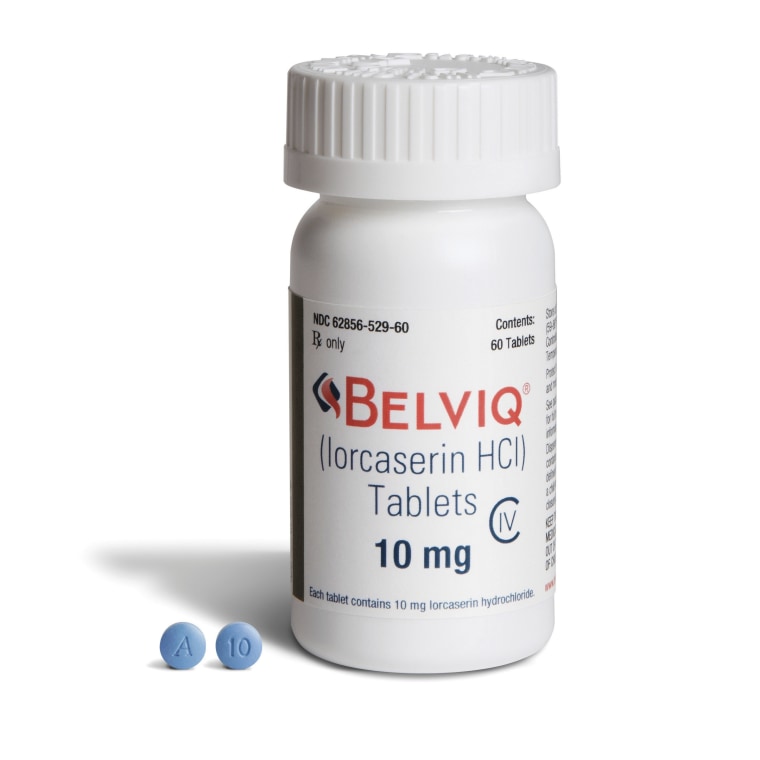For decades, doctors have sought every dieter's dream of weight loss: a pill that could pare away the pounds without any harmful effects.
Their quest is an acknowledgment that losing weight and keeping it off is not just a matter of willpower, of resisting the siren call of the ice cream in the fridge.
New research has shown that weight gain changes the brain and body. And even when we starve ourselves thin, we often can’t reverse those alterations. So we just slowly pack the pounds back on because our brains think we need them.
Back in the early '90s, doctors thought they had struck gold with a combination of drugs, fenfluramine and phentermine, or fen-phen, that seemed to magically melt fat away. But within a couple of years some patients began to develop very scary side effects: damage to heart valves that could lead to heart failure and a kind of high blood pressure, pulmonary hypertension, that proved to be fatal in some cases.
The Food and Drug Administration called on drugmakers to pull fenfluramine — the culprit part of the combo — which they did. The media attention that followed would scare patients off diet pills for years — a fear that continues today.
But with America growing fatter with each passing year — two-thirds of Americans are now overweight or obese — doctors believed that they had no choice but to continue their quest for a safe, and at least moderately effective, medicine that would help patients drop excess pounds and keep them off.
The latest generation of drugs seems to do just that. They won’t make a morbidly obese patient model-thin, but they’ll shave off enough excess fat to improve heart disease risk factors such as hypertension, high blood sugar and high cholesterol, experts say.
Take lorcaserin, for example. Researchers found that the drug could lead to consistent and sustained loss of more than 5 percent of weight in nearly 40 percent of patients at risk for heart attacks, strokes and death from cardiovascular disease without increasing the likelihood of such events, according to a report published recently in the New England Journal of Medicine.
The new study followed participants for three years. “Most prior studies of weight loss only followed patients for a year, and a few out to two years,” said the study’s lead author, Dr. Erin Bohula, an assistant professor of medicine at Harvard Medical School and a cardiologist and investigator with the TIMI Study Group at Brigham and Women’s Hospital in Boston. “The challenge with lifestyle interventions is that patients tend to lose weight up front, and then the weight is regained, sometimes beyond the original weight. So the challenge is to keep it off long term.”

While a 5 percent weight loss may not seem like a lot, “that is the point where there is a very significant reduction in the risk of diabetes,” said Dr. Louis Aronne, a professor of metabolic research at Weill Cornell Medicine. “A 5 percent loss of weight is associated with a 50 percent lower risk of diabetes and a 10 percent loss is associated with an 80 percent lower risk.”
Patients in Bohula’s study did see improvements in hypertension and blood sugar levels with weight loss.
People need to realize that in obesity treatment, just as in hypertension therapy, one drug won’t fit all, Aronne said. “In hypertension, there are more than 100 medications and more than 10 therapeutic categories,” he added. “That’s why treatment of hypertension is so effective. No one medication for hypertension works for every single person. That’s how we need to start looking at drugs for obesity.”
What many don’t understand is that weight gain leads to changes in the brain that may not be reversible, Aronne said. “The process of weight gain makes it hard to lose weight,” he explained, adding that in certain areas of the brain nerve cells are actually damaged and sometimes die.

That new understanding is why some major medical associations have come to see diet pills as intrinsic in the battle against obesity.
Weight loss drugs are recommended supplements to diet and exercise — included, for example, in 2013 guidelines by the American Heart Association, the American College of Cardiology and the Obesity Society, Bohula said. But there still “are relatively low rates of use. There are probably a few reasons for this, including cost, if not covered by insurance, and a perception that these agents are not safe in light of the history with weight loss agents.”
In fact, a 2017 report that examined the medical records of 2.2 million patients found that fewer than one in 50 patients who were eligible for a diet pill prescription received one.
That doesn’t surprise Dr. Vijaya Surampudi, an endocrinologist and an assistant professor of medicine at the Center for Human Nutrition at the University of California, Los Angeles. “I prescribe them all the time,” she said. “But they are not very popular. I think a lot of physicians are uncomfortable prescribing weight loss medications. Fen-phen scares off a lot of them.”
When it comes to dieting, Americans need to reframe how they view weight loss, Surampudi said. “People need to focus on the health benefits,” she said. “Rather than thinking about how good you’ll look in that dress, you need to be thinking, ‘I won’t get diabetes now.’"
Beyond that, a little patience goes a long way. “We didn’t put the weight on overnight,” Surampudi said. “And we shouldn’t expect it to come off overnight.”